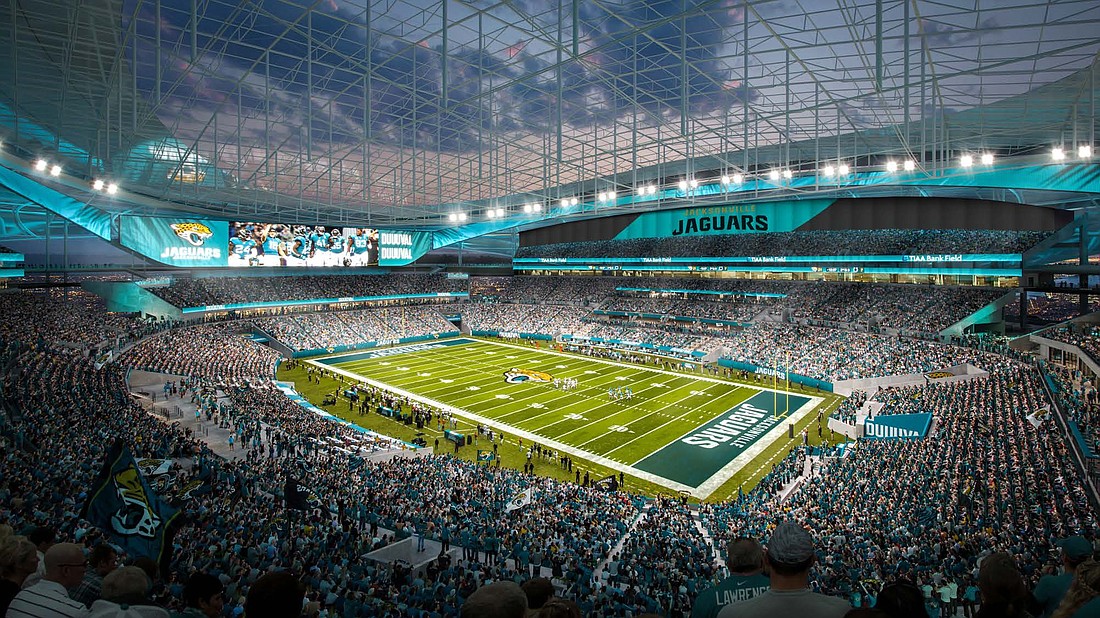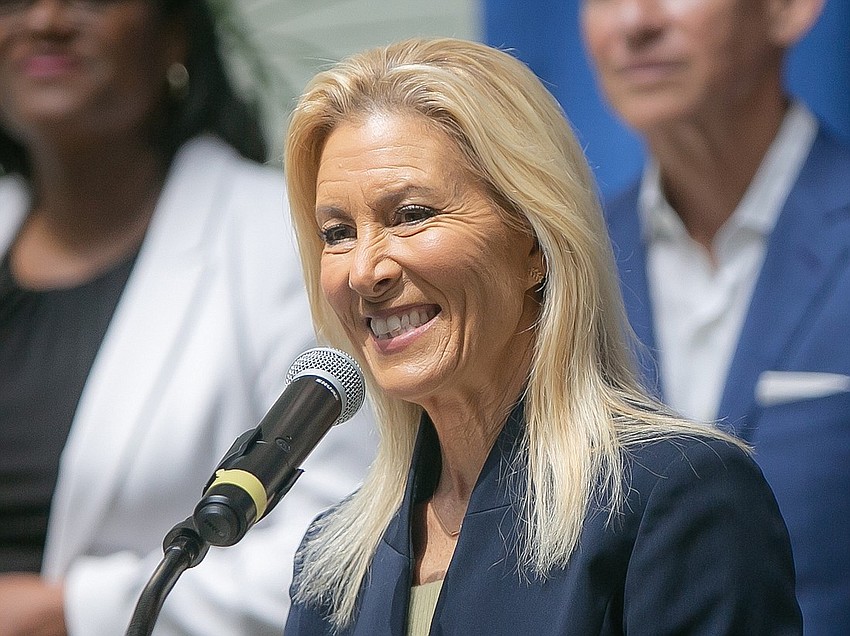
Mayor Donna Deegan says her administration is on track to deliver the framework of a deal to renovate EverBank Stadium to the Jacksonville City Council by April or May.
Speaking to reporters Feb. 8, Deegan said the current discussion includes both the city-owned stadium overhaul and construction of an adjacent dining and entertainment center.
The Jacksonville Jaguars have requested the city provide 50% of the costs of the “Stadium of the Future” and surrounding district, which together would cost an estimated $2.068 billion.
“I want to do whatever is the best deal for the taxpayers, and that may be doing something larger (than just the stadium), but I don’t know yet. We’re in the process of those talks,” she said.

A made-over EverBank Stadium would be downsized from 67,814 to 62,000 seats, with expansion capability up to 71,500 for college football games and concerts. The capacity can be expanded to more than 80,000.
New features would include a mirrored facade, a see-through shading membrane on the roof that would protect all seating areas from direct sunlight and rain, a wraparound concourse and lookout decks offering views of the Downtown skyline and St. Johns River.

Deegan said that once the framework is finalized, she plans to schedule public meetings for citizen input.
“I think it’s going to be important to try to come up with a framework by April or May and try to bring that in for a landing before the fall,” she said.
“The longer these things drag out, normally the more expensive they get and the more they go off the rails. And so I would really like to come to an agreement that everybody can feel good about and that we can move forward with sooner rather than later. And I think Council feels the same way.”
Council clashes
Deegan’s comments came amid sparks between the Council and her administration over removal of Confederate statues from a monument in Springfield Park and Sheriff T.K. Waters’ complaint that the administration failed to properly notify him that it was settling a lawsuit involving the Jacksonville Sheriff’s Office.
Both of those matters prompted the Council to file legislation that would limit the mayor’s office’s authority.
Under Ordinance 2024-0046, the mayor would be barred from using private donations to fund city operations without the Council’s approval.

Council President Ron Salem filed the ordinance after Deegan used funding provided by the Jessie Ball duPont fund and private donors to remove the statues.
The removal drew criticism from several Council members, who questioned whether Deegan overstepped her authority and violated historic protections for the monument supporting the statues.
Deegan said she was acting on an opinion from the Office of General Counsel that the monument’s protections only applied to demolition of the structure and not to removing the statues.

Council members accused Deegan of pressuring General Counsel Michael Fackler into crafting an opinion that supported her decision versus examining the facts and making an independent conclusion.
Deegan’s office responded by issuing a statement calling the issue a “manufactured controversy” and saying Council members “continue to take political cheap shots and try to create distractions to undermine the mayor.”
Waters, Salem and a majority on the Council are Republicans and Deegan is a Democrat.
The matter is still simmering, with discussion among Council members about whether to launch a special investigation into how Deegan went about removing the monuments.
Deegan said Feb. 8 that she felt the community should move on.
“I think once again, we need to move past the politics of the moment,” she said.
“I asked for an opinion from the general counsel, I received that opinion, I moved forward with a promise that I made during the campaign. And that opinion is binding. There’s really nothing else to say about that.”
Lawsuit settlement
The other piece of legislation, Ordinance 2024-0045, originally would have required the assent of Waters and other elected officials to settle lawsuits brought against their departments.
Waters sought that authority after saying he was not properly notified of a $200,000 settlement in a lawsuit related to the 2019 police killing of Florida A&M University student Jamee Johnson.

The original ordinance would have required Waters and other elected officials to sign off on any settlement agreement. The other officials are the tax collector, property appraiser, supervisor of elections and the clerk of courts.
The ordinance was amended during committee hearings and in its current form would require the Council president to step in if the elected officials and city officials disagreed on whether to settle.
Deegan’s staff apologized for the notification issue and committed to giving advanced notice to elected officials about any settlement. Critics of the ordinance say it is an unnecessary solution to a problem that has already been solved.
Stadium deal
Deegan said she did not believe the friction with the Council would affect progress on the stadium deal.
“I absolutely think everybody wants to get this deal done,” she said. “I think we’re all still rolling in that direction.”

As groundwork on the deal progresses, Deegan said she is particularly interested in developing a community benefit element as part of the deal. In Buffalo, New York, a proposed community benefit agreement for a new stadium for the Buffalo Bills would provide $3 million annually for anti-violence initiatives, mental health programs, recycling programs, food insecurity support, upward-mobility initiatives for impoverished and low-income neighborhoods and more.
“I think that’s going to be one of those things that is going to be important in terms of not only the deal, but in making our community feel good about it.”